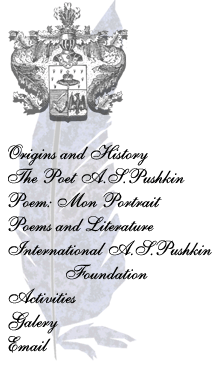
In the early fourteenth century the eldest child of the seventh generation descending from a viking family named Ratcha was given the nickname 'Pouchka' the Russian word for 'canon'. A canon had been used for the first time in 1346 in the battle of Crécy. Pouchka became Pushkin towards the end of the century.
In 1613 the Pushkin family who served the throne of Russia as boyards, counsellors, seneschals, constables and ambassadors, signed the act of election to the throne of the Romanoff dynasty.
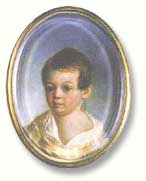
Alexandre Sergueievitch Pushkin was born in Moscow on June 6th 1799. His childhood was not an unhappy one. He was able to read books in French and English in the family library which was filled with litterature of foreign cultures. He grew up with French spoken around him, the language used by the nobility and the Court.
His grandmother and his nurse taught him Russian through their telling of traditional stories.
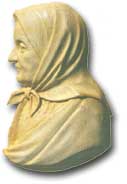 The poet's father Serge Pushkin was a lieutenant of the Imperial Guard who married Nadine Hanibal, the granddaughter of Abraham Hanibal. He was the son of an Ethiopian prince who was offered to Peter the Great who took him under his protection. Abraham Hanibal finished his career as commander in chief of the Imperial army.
The poet's father Serge Pushkin was a lieutenant of the Imperial Guard who married Nadine Hanibal, the granddaughter of Abraham Hanibal. He was the son of an Ethiopian prince who was offered to Peter the Great who took him under his protection. Abraham Hanibal finished his career as commander in chief of the Imperial army.
In 1811 he entered the newly opened Lycee Imperial Alexandre for the formation of the Rusian elite. He studied there for six years. At the lycee he was nicknamed the Frenchman because he wrote his first verses there in French... My portrait, Stanzas, Couplets etc
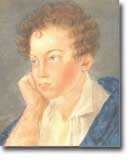
After graduating from the lycée he joined a society of young liberals and wrote several poems which angered the tsar... The Village, Ode to Liberty. He had to leave St.Petersburg for the Caucasus.
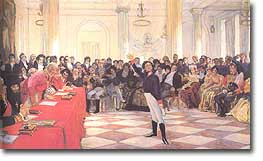 |
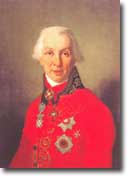 |
In 1820 he published Rouslan and Ludmila.
In 1822 he published The Prisoner of the Caucasus and completed The Gabrieliade.
In 1823 he wrote the two poems Eugene Onegin and The Gypsies.
In 1825 he undertook the drafting of the twenty-four pictures of Boris Goudonov and completed the work in November. Boris Goudonov would be published in 183but never performed during the writer's lifetime.
In 1827 he began a historical novel re-enacting the life of his ancestor Hanibal, entitled The Negro of Peter the Great.
In 1830 Pushkin left for his estates in Bolodino. Due to the outbreak of the plague in Moscow which was placed under quarantine he had to prolong his stay. During that time he wrote he wrote and published his four Small Tragedies and five Tales of Ivan Petrovitch Belkine.
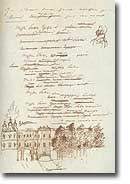 |
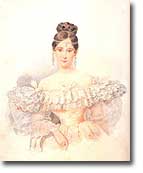 |
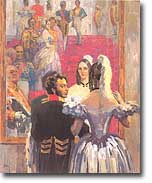 |
In 1831 on the 18th of February, he married Nathalie Nicolaevna Gontcharova.
Nicolas the First asked Pushkin to write the history of Peter the Great.
In 1832 on the 2Oth of May, his first daughter Mary was born.
In 1833 Pushkin was elected as a member of the Russian Academy. He wrote The Cavalier in Bronze. On July 18 his first son Alexandre was born.
In 1834 he published The Queen of Spades and also began to write History of the Pougatchov Riot.
In 1835 on the 14th of May, his second son Gregory was born.
In April of 1836 the first issue of the trimestrial review The Contemporary was granted permission for publication. On the 23rd of May, his second daughter Nathalie was born. In the same year he completed The Captain's Daughter.
In 1837 on the 27th of January, Pushkin was mortally wounded in a duel with the Baron of Heekeren d'Anthes. For two days he endured terrible pain and died on the 29th.
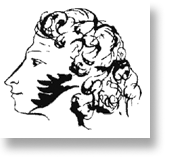
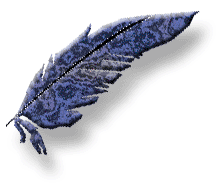
(1) Alexandre Pushkin
(2) A Radionovna Pushkin's nurse
(3) Pushkin when he entered the Imperial Lycée in 1811
(4) Pushkin at the Imperial Lycée, at his final oral examinations
(5) President of the Jury and Russian poet Derjavine
(6) Manuscript of poet Alexandre Pushkin
(7) Nathalie Goutcharova, Pushkin's wife
(8) Pushkin and his wife at the ball
(9) Portrait of Alexandre Pushkin
